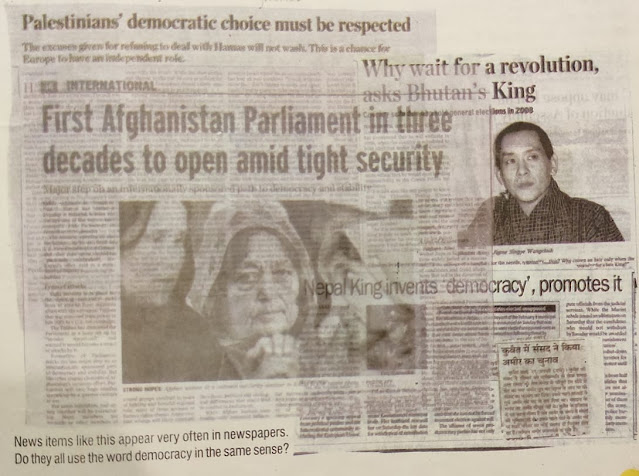VIII.Objectives.Insides.Chapter8.The Modern India
Chapter 8.
The Modern India.
Inside Questions/Answers
Page no 95.
The Modern India.
Inside Questions/Answers
Page no 95.
Q.1. In which century Modern Period of Indian history began?
Ans - About Eighteenth century
Q.2. When did the Mughal emperor Aurangzeb breathe his last?
Ans: - The Mughal emperor Aurangzeb breathed his last in 1707.
Q.3 - How was India exploited?
Ans - India was exploited politically, socially economically and culturally.
Q.4 In which century East India Company extend and consolidate its control over India more?
Ans - In 19th century East India Company took control over India like - military action,introduction of Railways, Postal service, passing different acts, etc..
Q.5 The Revolt of 1857 was ruthlessly suppressed by whom?
Ans- The Revolt of 1857 was a major event but the colonial power suppressed
it ruthlessly.
Q.7 When the Indian National Congress was established?
Ans- Indian National Congress was established in 1885.
Q.8 What were the major events of 12th century in India?
Ans- the major events of twelfth century in India where the the partition of Bengal , formation of Muslim League , Home Rule League Jallianwala Bagh Massacre, etc..
Q.9 When did India gain independence and with whose leadership?
Ans- India was able to end the British rule and gain independence in 1947 under the leadership of Mahatma Gandhi and many other national leaders as Rajendra Prasad,Subhas Chandra Bose ,J.L.Nehru and Sardar Vallabh Bhai Patel.
Q.10 How long British ruled over India?
Q.10 How long British ruled over India?
Ans- The British ruled over India for almost 200 years.
Q.11 Which documents give information about British rule?
Ans- The documents which give information about British rules are:-
a.Morley Minto reform (1909) b.Report of the Simon Commission (1929)
c.The Government of India Act (1935) etc.
Page no 96
Inside Questions/Answers
Inside Questions/Answers
Q.1.Who wrote the book 'Anandmath' and 'Unhappy Indians'?
Ans - The Bengali famous writer Bankim Chandra Chattopadhayay wrote the book 'Anandmath'and Lala Lajpat Rai wrote the book 'Unhappy Indians'.
Q.2. About how many books are there in library of Gandhiji?
Ans - 6000
Q.3. Which slogan was given by Bal Gangadhar Tilak?
Ans - The slogan "Freedom is our birth right" was said by
Q.4.In which language Bal Gangadhar Tilak's Kesari was written?
Ans - In Marathi language
Q.5.Who wrote our National Song Bande Matram..?
Ans - Bankim Chandra Chatarjee wrote the 'Aanadmath' that too describes our National Song Bande Mataram...
Q.6.Describe any 3 features of letters,writings and speeches with the examples.
Ans - (a) They provide us information about the development that takes place during a particular period.
(b) Some examples are of The collection of writings of Gandhiji at Gandhi Smriti near Rajghat in Delhi.
(c) Some slogans of famous heroes also tell us about patriotic feelings and the national fervour during our struggle for independence.
Examples are - ' You give me blood and I will give you freedom,‘Delli Chalo' by Subhash Chandra Bose. Mahatama’s mantra ‘Do or Die’.
Q.7.In Which year when British passed the Vernacular Press Act was passed?
Ans - The British passed the infamous Vernacular Press Act in 1878 that was highly opposed by the Indians unitedly.
Page 97.
Inside Question Answers.
Q.1.What is the full form of CD-ROM?
Ans - The full form of CD-ROM stands for Compact Disc Read Only Memory.
Q.2.The basic objectives behind the surveys and reports of which Government ?
Ans - British Government.
Q.3.Where is Victoria Terminous Situated?
Ans -The Victoria Terminous is Situated in Mumbai.
Q.4.Where is Victoria Memorial Situated?
Ans -The famous archaeological monument, Victoria Memorial is situated in Kolkata.
Page 98
Inside Questions Answers :-
Q.1.Where did many changes that took place around the world originated?
Ans - Many important eventful changes that took place around the world originated in Europe
Q.2.Name some examples of artifacts.
Ans - The some examples of artifacts are Weapons,Jewellery,Coins etc.
Q.3.What is Vernacular?
Ans - The language or dialect spoken by the common people of a particular country/clan/group is known as vernacular.
Q.4.What are the important changes that took place in the world which originated in Europe?
Ans -The inspirational changes that took place in the world are Renaissance(14 to 16th Century),Reformation(16th Century), Industrial Revolution (1750) , French Revolution (1789), Russian Revolution (1917) , Nationalism , Imperialism the etc.
Thanks.

Comments
Post a Comment